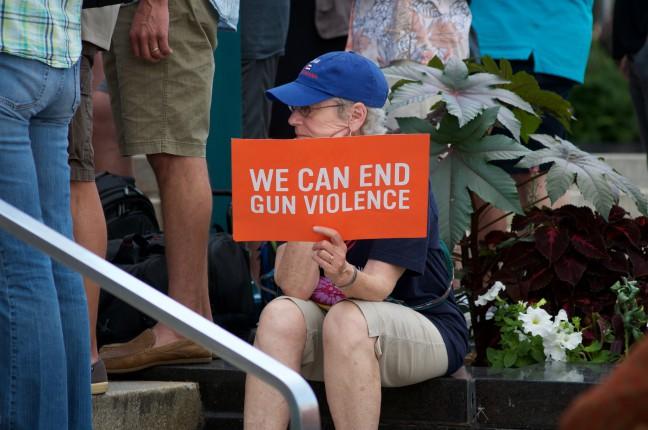Freedom, liberty and guns. These words are meant to exemplify the fundamental American ideals, the very cornerstone of American culture.
Armed with the Second Amendment, people are invulnerable to unwanted government interference. These well-educated, upstanding citizens have the ability to defend themselves from any and all attacks to them, their families or property. That is the primary role of guns — defense, never offense.
With the increasing incidents of mass shootings and overall rates of gun violence within the United States, this sentiment cannot be farther from the truth.
Many are still reeling from the two mass shootings which took place in early August. They happened within 24 hours of each other. The first shooting in El Paso, Texas, resulted in 22 fatalities. The second took place outside a bar in Dayton, Ohio, where 9 people were senselessly gunned down.
These were not the first or even last shootings which have taken place in 2019. This year, we have had 29 mass murders, which are defined by four or more people killed. In terms of mass shootings, where four people or more are injured by a gun, they outnumber the number of days in the year — 385 mass shootings within less than 365 days.
As mass shootings continue, Wisconsin, national gun control debates remain polarized
The threat of being gunned down in public is a very real, pervasive threat which every person in this country must confront. While the majority of people will never encounter gun violence, its unprecedented nature within American society makes gun control a core issue in political and societal discourse. In response to the Dayton and El Paso massacres, President Trump said, “mental illness and hatred pull the trigger … not the gun.”
This is an echo of a popular saying from anti-gun control groups, such as the National Rifle Association, “guns don’t kill people, people do.”
Among others, Trump blamed the internet, video games and mental illness for the shootings. But the data doesn’t lie. Other countries have similar rates of mental illnesses, including similar rates of depression, anxiety and suicidal behavior. Other countries have the internet, violent video games and media which young children somehow consume despite the efforts of parents. But in America, people are ten times more likely to die due to gun violence.
The only difference between America and other countries is the sheer number of guns within the U.S., where America has one of the highest levels of gun ownership of any country — 88.8 guns per 100 people, as measured in 2012.
Speculation insufficient to warrant seizure of citizens’ guns
The oversimplification of the issue of gun violence in America as stated by Trump and other NRA supporters makes it harder to find a solution for gun violence prevention. “Fix mental illness” proposes no real, viable answer to the tragedies America faces practically daily. While improving access to mental health care is a positive move for the country, it does nothing to prevent gun violence.
Several studies have shown those with mental illnesses commit a tiny percentage of mass shootings as witnessed today. According to the American Journal of Psychiatry, people with mental illnesses commit 3-5% of violent crimes, including mass shootings. Moreover, they are more likely to be victims themselves.
While this isn’t to say shooters do not have mental health problems, the vast majority do not have a psychiatric mental illness. The most common traits of mass shooters relate to race and ideology — 97% of shooters are white, and many of these perpetrators hold racist, sexist or otherwise problematic beliefs.
Therefore, the Trump Administration’s proposal to monitor mentally ill people in an effort to prevent future violence is unconstitutional — with respect to the Fourth Amendment — and a completely ineffective solution to the gun problem.
A good start to addressing the prevalence of gun violence in America is by, you guessed it, gun control. In Australia, various rules were put in place to limit the number of assault weapons in the country. It was a massive success — gun violence was reduced by 72%. Similar actions taken in America may yield similar results.
Attributing gun violence to mental illness has several dire consequences. It further stigmatizes mental illness and, in turn, hinders conversations of mental health in America. It creates an image of who can and cannot be a shooter, which leaves people more vulnerable to violence by perpetrators who do not fit their image of what a shooter looks like.
In this train of thought, various pro-gun organizations are calling for campuses to remove gun-free zones. After all, who would be better gun carriers than the educated youth? What better way to protect the future of America?
At the University of Wisconsin, all campus buildings are gun-free zones. But, current Wisconsin laws require UW to allow conceal-and-carry of weapons on campus. Furthermore, the Wisconsin State Assembly proposed legislation which would allow anyone to carry weapons in all UW buildings, including dorms and classrooms.
This legislation is extremely problematic and severely jeopardizes the safety of all UW students. Making UW more gun-friendly is a recipe for a tragedy akin to campuses around the nation, such as the University of North Carolina shooting which resulted in the deaths of two UNC students.
For the safety of all at UW, it is imperative we protest anti-gun control legislation and avoid the oversimplification of America’s gun violence issue as Trump and his supporters blame mentally ill people despite empirical evidence suggesting otherwise.
Let’s be real, in no world are semiautomatics a defensive weapon. Overall, guns are used far more to intimidate than in self-defense.
In this regard, UW must remain a gun-free zone if we don’t want students to become casualties in the pursuit of the American ideal.
Samiha Bhushan ([email protected]) is a freshman studying neurobiology and English literature.




















